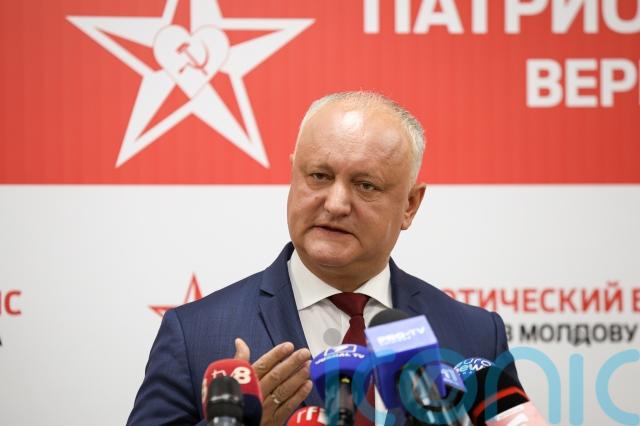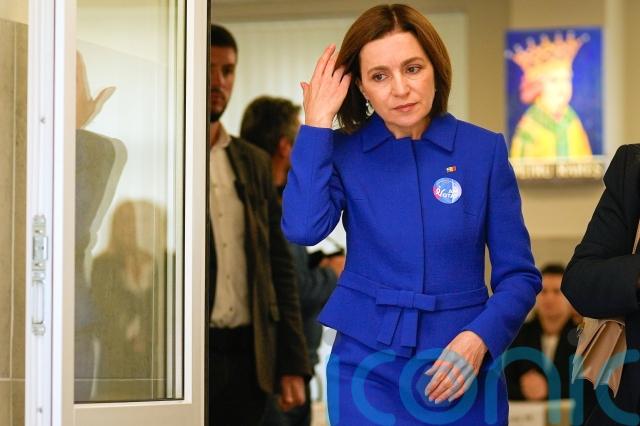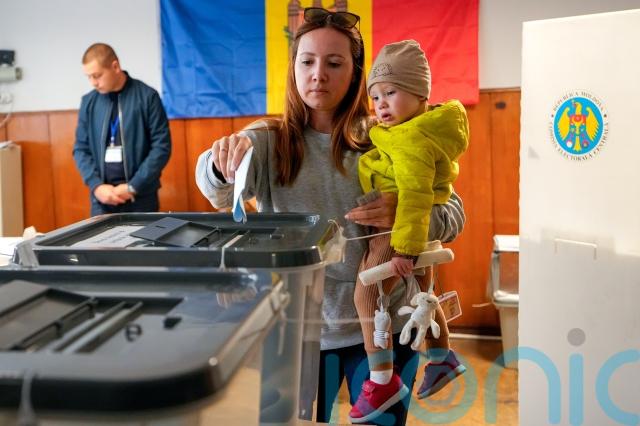
Moldova’s pro-western ruling party appears to be on track to top polls in a critical parliamentary election that was overshadowed by Russian interference claims.
The race was widely viewed as a geopolitical choice between a path to the European Union or a drift back into Moscow’s fold.
The tense ballot pitted the governing pro-western Party of Action and Solidarity, which has held a strong parliamentary majority since 2021, against several Russia-friendly opponents but no viable pro-European partners, and it was not yet clear whether the party would secure a majority.

With about 75% of polling station reports counted, official electoral data showed the pro-EU Party of Action and Solidarity leading with 44.3% of the vote, while the pro-Russian Patriotic Electoral Bloc had 27.7%.
The Russia-friendly Alternativa Bloc stood at 8.5% and the populist Our Party — which wants “balanced foreign policy” between East and West — had 6.5%. The right-wing Democracy at Home party had 6%.
The election day was marked by a string of incidents, ranging from bomb threats at multiple polling stations abroad to cyber attacks on electoral and government infrastructure, voters photographing their ballots and some being illegally transported to polling stations.
Police also detained three people suspected of plotting to cause unrest after the vote.
The pivotal vote will elect a new 101-seat parliament, after which Moldova’s president nominates a prime minister, generally from the leading party or bloc, which can then try to form a new government. A proposed government needs parliamentary approval.
When polls closed locally at 9pm (6pm GMT) on Sunday, the central electoral commission reported that more than 1.59 million, or about 51.9% of eligible voters had cast ballots, including 264,000 Moldovans in polling stations set up abroad, which would remain open until 7pm in their respective countries. In the 2021 parliamentary election, turnout was just over 48%.
Igor Grosu, the leader of Party of Action and Solidarity, said after polls closed that “Russia’s attempts to hijack the electoral process have been huge” and that state institutions made efforts to ensure the security and integrity of the voting.
“The consequences of this intervention are hard to estimate at this hour,” he said.

“We are waiting for the election results. We pray for patience and calm.”
Moldova is landlocked between Ukraine and EU member Romania. The country of about 2.5 million people has spent recent years on a westward path and gained candidate status to the EU in 2022, shortly after Russia launched a full-scale invasion of Ukraine. Tensions between Russia and Moldova, a Soviet republic until 1991, skyrocketed.
After casting her ballot on Sunday, Moldova’s pro-western president Maia Sandu reiterated long-held claims that Russia “massively interfered” in the election, saying she voted “to keep the peace” and that her country’s future lay within the EU.
Days before Sunday’s vote, Moldovan prime minister Dorin Recean warned that Russia was spending “hundreds of millions” of euros as part of an alleged hybrid war to try to seize power, which he described as “the final battle for our country’s future”.
The alleged Russian strategies included a large-scale vote-buying operation, cyber attacks, a plan to incite mass riots around the election and a sprawling disinformation campaign online to diminish support for the pro-European ruling party and sway voters toward Moscow-friendly ones.

Just before the vote, police carried out hundreds of raids, detaining scores of people allegedly trained in Serbia to cause “mass riots” and destabilise the country around the critical election.
Russia has repeatedly denied meddling in Moldova and dismissed the allegations last week as “anti-Russian” and “unsubstantiated”.
But on Sunday, Moldovan police said they had information about “groups of people” planning to cause unrest from around midnight and on Monday during a protest in Chisinau, to create “disorder and destabilisation”.
Igor Dodon, a former president and a member of the pro-Russian Patriotic Electoral Bloc, called for a protest in front of the parliament building on Monday, and later alleged after polls closed that the pro-western ruling party “is now in panic and is considering various pretexts, excuses and scenarios that go beyond the law and democratic norms”.
Subscribe or register today to discover more from DonegalLive.ie
Buy the e-paper of the Donegal Democrat, Donegal People's Press, Donegal Post and Inish Times here for instant access to Donegal's premier news titles.
Keep up with the latest news from Donegal with our daily newsletter featuring the most important stories of the day delivered to your inbox every evening at 5pm.